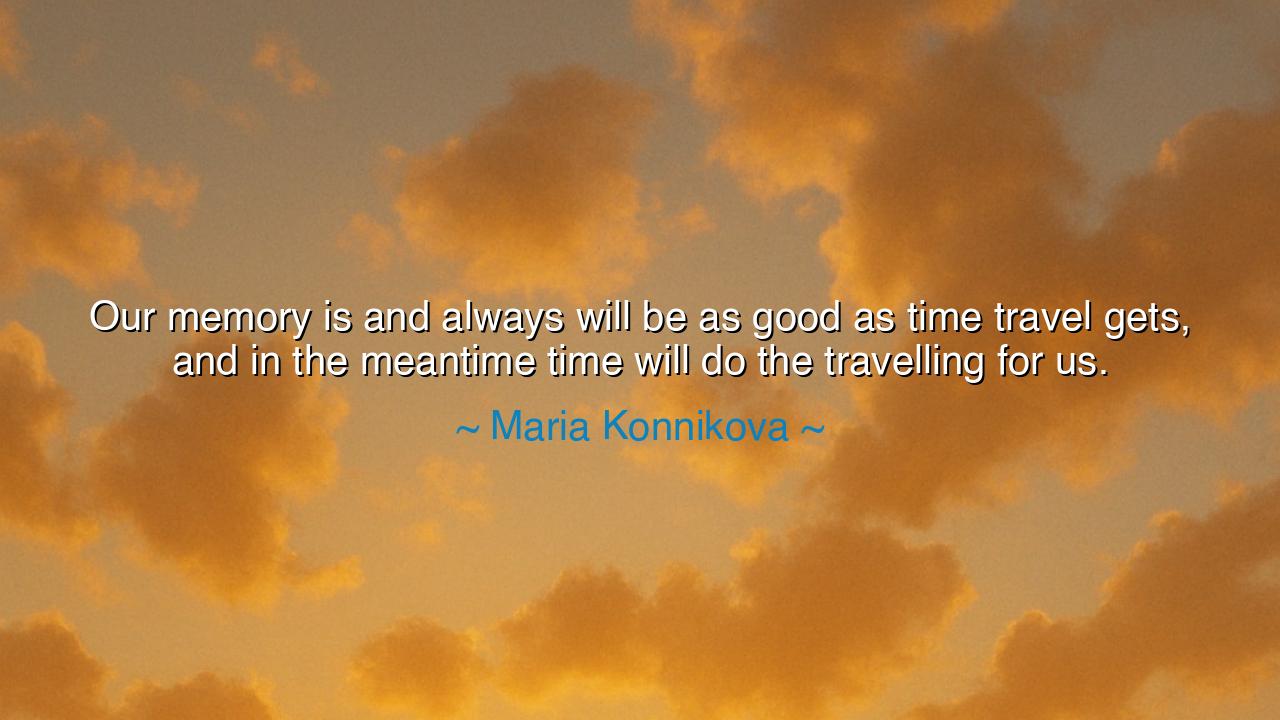
Our memory is and always will be as good as time travel gets
Our memory is and always will be as good as time travel gets, and in the meantime time will do the travelling for us.






In the words of Maria Konnikova, “Our memory is and always will be as good as time travel gets, and in the meantime time will do the travelling for us.” This saying is a lantern lit in the cavern of the human soul, for it reminds us that though no man may stride backward into the ages nor leap forward into the centuries, we hold within us a power nearly as wondrous: the memory, that fragile and eternal flame. Through memory, we revisit the laughter of children long grown, the voices of the departed, the triumphs and the wounds of our youth. Though our bodies cannot voyage to yesterday, our spirits ride upon memory as though upon a chariot across the ages.
The ancients themselves knew this truth, though they clothed it in myth. When Homer sang of Odysseus, stranded upon distant shores, it was not only the sea that bound him, but also the ache of memory for his home and Penelope’s patient vigil. Memory kept him alive, for it gave him both pain and strength. It was his inner form of time travel, transporting him across waves of longing until fate restored him to Ithaca. And so it is with us: memory carries us where no machine, no craft of science, can ever truly go.
Yet, while we travel backward in thought, time itself journeys forward, heedless of our desire to stay the hand of its march. The river of years flows on, and none can swim against its current. Empires have risen, only to fall into dust; mighty Rome, whose legions once ruled the earth, lies now as ruins, remembered only because the human heart bears memory of its grandeur. The stones crumble, the palaces vanish, but memory travels faithfully across centuries, whispering stories into the ears of those not yet born.
Consider also the tale of Anne Frank, whose short life was consumed by darkness. She did not step into the future to see the world beyond war, yet her diary became her vessel of time travel. Through it, her voice journeys across decades, reaching those who would never meet her eyes. Her memory, preserved in words, travels where she herself could not, proving that memory is more enduring than flesh, more patient than the ticking of clocks.
But we must remember that memory is both a gift and a burden. It can warm us with the glow of past joys, yet it can also chain us with sorrow and regret. To dwell only upon the shadows of what has passed is to become a prisoner of one’s own mind. The wise learn not to banish memory, but to temper it, as iron is tempered in the forge, so that its strength may serve rather than wound. The responsible traveler of memory is one who chooses which visions to carry forward and which to let dissolve into the mist.
Thus, the lesson unfolds: let us honor our memory as a sacred power, but let us not cling so tightly that we forget the flow of time itself. Time will always do the traveling, with or without our consent. The years will roll on, carrying us to new seasons, new trials, new joys. But by tending our memory wisely, we can travel alongside time, holding in our hearts what is worth keeping, and learning from what is worth releasing.
Practical action follows from this wisdom. Keep journals, so that your memory may outlive your days, just as Anne Frank’s did. Cherish photographs, stories, and songs that tether you to those you love. Yet also practice the art of letting go: do not chain yourself to wounds that cannot be healed by constant remembrance. Instead, weave the past into a cloak of strength, and wear it as you walk toward the future.
In this way, Maria Konnikova’s words become not merely reflection but command: Use memory as your time machine, but let time remain your guide. For the one who balances remembrance and living will find themselves rich in spirit, unafraid of what lies behind or ahead. And when the final journey comes, they shall depart not empty-handed, but carrying within them the treasures of memory—the closest to time travel that humankind shall ever know.






AAdministratorAdministrator
Welcome, honored guests. Please leave a comment, we will respond soon